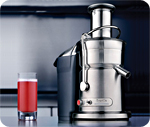
Juicers: A simplified buying guide
Tuesday, November 13, 2012 by: John McKiernan
Tags: juicers, buying guide, superfood
- Newly released JFK files reveal Pentagon's role in creating Lyme disease and covid in the same lab
- DEADLY DECEPTION: How COVID vaccines increased mortality rates and why authorities hid the truth
- CDC finally halts $11 billion COVID funding scam as health officials admit the ‘pandemic’ was a fraud
- The hidden dangers in your kitchen: How cooking methods impact diabetes, cancer and aging
- GAIN-OF-FUNCTION CAT-BIRD-FLU now on the rise as nearly a dozen cats in Colorado "test positive" for Bird Flu due to contaminated cat food
- Here are TEN all-natural ways to protect your garden without using harmful chemicals
- Trump's greatest betrayal so far: Accelerating Middle East wars, silencing dissent, and serving Zionist masters
- Why you should think twice before buying mainstream toothpaste formulas
- Ginseng's hidden anti-aging power: How compound K is rewriting the rules of skincare
- ATTENTION PRESIDENT TRUMP: Please WITHDRAW your nomination of Dr. Susan Monarez for CDC Director as she is a VAX FANATIC and TOXIC JAB ZEALOT
- Was JFK's assassination orchestrated by a CIA double agent? New evidence points to James Angleton as the “architect”
- “Endgame: The Hidden Agenda 21” unveils a world of conspiracy and control
- Home gardening for preppers: A beginner's guide to growing your own food
- Senate Democrats deny censorship industrial complex existed, defend government's role in silencing dissent
- Record honeybee deaths devastate U.S. agriculture, pesticides under scrutiny
- Paper or plastic? The environmental deception behind bag bans
- Lab leak confirmed? Boris Johnson's stunning reversal on COVID origins sparks global debate
- Speaker Johnson warns Congress may defund or disband rogue courts targeting Trump
- Newly released JFK files reveal Pentagon's role in creating Lyme disease and covid in the same lab
- Elon Musk: Aliens could be here on Earth RIGHT NOW
- Festive flavors: The sweet history, nutritional profile and health benefits of pecan pie
- Trump reverses course on Gaza plan, says “nobody is expelling Palestinians”
- Reclaim your health: How midlife exercise reverses years of inactivity
- Big Pharma's $8 Billion bribery scheme exposed: how doctors are pushed to prescribe junk science, not heal
- Boys are back in town: Trump’s patriotic alpha crew takes the wheel while toxic females ride in the backseat
- EPA advisor admits the agency is funneling billions to climate groups ahead of Trump’s return to White House
- Space war brewing? Russia threatens to destroy Starlink satellites
- Survival 101: Effective EMF blocking techniques
- A lack of integrity in Academia: Harvard professor found GUILTY of fraudulent research to promote CRT theory
- Mike Adams Sermon 66: God will DESTROY ISRAEL for its wickedness
- 5 Simple steps to boost your brainpower: How to strengthen executive function in a distracted world
- Rep. Nancy Mace introduces bill to ban biological males from female facilities on federal property
- Sugarcane extract superior to cholesterol-lowering drugs?
- WHO focusing more on policing speech about public health and implementing global surveillance systems
- Pilots report mysterious lights 'moving at extreme speeds' across Oregon skies
- Dr. Mike Yeadon releases 15-minute testimony - WATCH - about genocidal intent of COVID “vaccines”
- EPA advisor admits the agency is funneling billions to climate groups ahead of Trump’s return to White House
- The Health Ranger releases “Vaccine Zombie” song and music video, using AI-animated zombies for the music video
- California's social media censorship law struck down: A victory for free speech or a threat to online safety?
- Dr. Mike Yeadon releases 15-minute testimony - WATCH - about genocidal intent of COVID “vaccines”
- The pandemic as a tool for INDOCTRINATION: Understanding “The Indoctrinated Brain” by Dr. Michael Nehls
- Florida takes a stand: DeSantis proposes permanent ban on mRNA vaccine mandates
- Mike Adams releases country western hit single: Goin’ Back in Time is Comin’ Home
- Mike Adams releases music poetry sensation: A Child of God
- “Why we influenced the 2020 elections”: Facebook files reveal the coordinated effort to bury the Hunter Biden laptop story
- RFK Jr. clears key hurdle: Sen. Susan Collins backs controversial HHS nominee, signaling a new era for health policy
- Unpacking the Lies That We’ve Been Fed – new song and music video released by Mike Adams, the Health Ranger
- Mike Adams releases new song and music video: Nothing More Disgusting Than a Globalist
- Newly released JFK files reveal Pentagon's role in creating Lyme disease and covid in the same lab
- Congratulations to the FULLY UNVACCINATED as you resisted the COVID-19 PROPAGANDA MACHINE fueled by over $100 BILLION
- Michigan sheriff announces criminal investigation into 2020 election crimes, Dominion Voting Systems
- Israeli soldiers accused of even more torture and abuse in the West Bank
- Migrants are taking advantage of recent hurricanes to scam residents and loot their homes
- House Intelligence Committee calls for the ARREST and PROSECUTION of Dr. Anthony Fauci
- Red Cross issues warning to stop blood plasma donations from vaccinated people
- Scientists confirm: GENIUS brain function can be spontaneously unleashed in humans without any apparent cause
- EPA advisor admits the agency is funneling billions to climate groups ahead of Trump’s return to White House
- HYSSOP: What research reveals about the health benefits of this ancient holy herb
- Two containers with completed ballots fall out of truck in Florida
- Fully vaccinated about to see “tsunami” of illness and death, warns virologist
- Global leaders unite to clamp down on “misinformation” with UN-backed Cascais Declaration
- BREAKING: 2025 NDAA authorizes mandatory military draft of WOMEN across America… as Pentagon pursues global NUCLEAR war with both Russia and China at the same time
- Michael Yon warns of a ZIONIST TAKEOVER in Trump’s second administration
- BOMBSHELL: DNA testing kits are a SCAM to develop ethnic-specific bioweapons
- Ozempic and Wegovy weight loss drugs are injectable LIZARD VENOM PEPTIDES that may unleash a devastating wave of organ failure… side effects align with symptoms of SNAKE BITES
- Israeli soldiers accused of even more torture and abuse in the West Bank
- These 13 countries just signed an agreement to engineer a global FAMINE by destroying food supply
- NASA admits that climate change occurs because of changes in Earth’s solar orbit, and NOT because of SUVs and fossil fuels
- RFK Jr. clears key hurdle: Sen. Susan Collins backs controversial HHS nominee, signaling a new era for health policy
- Sermon 30: How Jesus reveals Caesar’s FAKE CURRENCY and FALSE AUTHORITY
- Coriander seeds: Ancient medicine backed by modern science
- Arizona officials claim Maricopa County needs 10-13 days to tabulate results of the election
The key is to be sure the juice is consumed immediately and is produced in a way that extracts the most nutrients possible. There are three main types of juicers available which work in different ways and have different advantages. This simple guide will explain the key differences between them so you can purchase the best juicer for you.
Centrifugal juicers
Centrifugal juicers work by shredding the solids into tiny pieces while spinning, which causes the juice to be pressed out through centrifugal force. Think of a washing machine on the final spin cycle when the water is being spun out of the clothes. Centrifugal juicers are popular because they are the least expensive type of juicer. The problem here is that the shredding and spinning process creates heat and also allows more oxygen to penetrate the food. Heat and oxygen will both destroy some of the nutrients in the juice, making it less nutritious. With that said, even juice made with centrifugal juicers is far more nutritious than anything you can buy at the grocery store.Pros: Fast and inexpensive.
Cons: Comparatively lower quality juice, produces less juice, sometimes noisy.
Price Range: $80-$250
Cold press juicers
Cold press juicers include both twin gear and single gear juicers. These machines operate by masticating or chewing the solids and squeezing the juice out. The gears turn slowly which means no heat and no oxidation, which produces a higher quality juice. More enzymes, vitamins and minerals are extracted by this process when compared to centrifugal juicers. Masticating juicers, as they are often called, are more expensive, heavier and slower than centrifugal juicers.Pros: Higher quality juice, higher yield, juice lasts longer, can serve in other food processing functions.
Cons: More costly, heavier, slower, more food preparation due to typically narrower shoots.
Price Range: $250-$500 or more depending on the brand.
Manual juicers
Manual juicers can be a great alternative if you want to save some money and don't mind putting in a little elbow grease. They produce a very high quality juice with a high yield.Pros: High quality juice, higher yield, easy to use, easy to clean, inexpensive.
Cons: Slow, more labor intensive, sometimes limited to certain fruits and vegetables.
Price Range: A good manual juicer should cost about $100.
Recommendations
If you're looking for the top of the line, very best the juicer available then go with the Norwalk juicer. This juicer uses a hydraulic press to extract maximum juice and maximum nutrients. It is the official juicer recommended for Gerson therapy. The only downside to this juicer is it carries a $2,400 price tag. If you want something more affordable, the Hurom slow juicer sells for around $350 and possesses all of the advantages of a cold press juicer without many of the downsides. You can read more about it here.Sources for this article include:
https://www.naturalnews.com/028128_Hurom_slow_juicer_juicing.html
http://foodmatters.tv/content/juicer-buying-guide
http://www.harvestessentials.com/whatjuicisri.html
http://myglutenfreequest.com/juicer-evaluation-recommendation/
About the author:
See more health news articles by John McKiernan at The Holistic Truth
Juicers at FETCH.news
Get independent news alerts on natural cures, food lab tests, cannabis medicine, science, robotics, drones, privacy and more.
Take Action: Support Natural News by linking to this article from your website
Permalink to this article:
Embed article link: (copy HTML code below):
Reprinting this article:
Non-commercial use OK, cite NaturalNews.com with clickable link.
Follow Natural News on Facebook, Twitter, Google Plus, and Pinterest
Science News & Studies
Medicine News and Information
Food News & Studies
Health News & Studies
Herbs News & Information
Pollution News & Studies
Cancer News & Studies
Climate News & Studies
Survival News & Information
Gear News & Information
News covering technology, stocks, hackers, and more



"Big Tech and mainstream media are constantly trying to silence the independent voices that dare to bring you the truth about toxic food ingredients, dangerous medications and the failed, fraudulent science of the profit-driven medical establishment.
Email is one of the best ways to make sure you stay informed, without the censorship of the tech giants (Google, Apple, Facebook, Twitter, YouTube, etc.). Stay informed and you'll even likely learn information that may help save your own life."
–The Health Ranger, Mike Adams












































